
Clinical and Experimental Emergency Medicine
Scope & Guideline
Connecting researchers and practitioners in emergency care.
Introduction
Aims and Scopes
- Emergency Care Practices:
The journal emphasizes research and reviews related to best practices in emergency care, including innovative treatment protocols, pain management strategies, and procedural techniques in emergency settings. - Clinical Outcomes and Prognosis:
A significant focus is placed on studies that investigate clinical outcomes, prognostic factors, and the efficacy of various interventions in emergency medicine, aiming to improve patient survival and recovery rates. - Technological Advancements:
The journal explores the integration of new technologies in emergency medicine, such as point-of-care ultrasound, artificial intelligence, and telemedicine, highlighting their impact on diagnosis and treatment. - Public Health and Epidemiology:
Research on public health trends, epidemiological studies, and the impact of external factors (like pandemics) on emergency department utilization and patient outcomes is a core area of focus. - Education and Training:
The journal addresses the importance of education and training in emergency medicine, including simulation training, competency assessments, and the development of guidelines for emergency medical professionals.
Trending and Emerging
- Point-of-Care Ultrasound:
There is a significant increase in research related to point-of-care ultrasound, emphasizing its role in rapid diagnosis and management in emergency settings, improving patient outcomes and procedural efficiency. - Artificial Intelligence and Machine Learning:
Emerging studies focus on the application of artificial intelligence and machine learning in predicting patient outcomes, enhancing diagnostic accuracy, and optimizing emergency care workflows. - Impact of COVID-19 on Emergency Medicine:
Research examining the repercussions of the COVID-19 pandemic on emergency department operations, patient demographics, and treatment strategies has surged, highlighting the need for adaptive practices in crisis situations. - Mental Health in Emergency Care:
There is a growing emphasis on the recognition and management of mental health issues in emergency settings, reflecting an increased awareness of the psychological aspects of patient care. - Telemedicine and Remote Care:
The rise of telemedicine as a viable option for patient assessment and follow-up in emergency medicine is increasingly featured, showcasing its relevance in enhancing access to care and maintaining continuity during health crises.
Declining or Waning
- Traditional Pharmacological Interventions:
Research centered on traditional pharmacological treatments for common emergency conditions appears to be decreasing, possibly overshadowed by more innovative approaches and technologies. - Invasive Procedures Without Technological Support:
There is a noticeable decline in studies related to traditional invasive procedures that do not incorporate technological advancements, as the focus shifts towards minimally invasive techniques and enhanced imaging. - Historical Case Reports:
The publication of historical case reports has waned, indicating a potential shift towards more comprehensive studies or clinical trials that provide broader insights rather than individual cases. - Non-Critical Care Topics:
Research focusing on non-critical care issues or less acute conditions within the emergency department is becoming less frequent, suggesting a tighter focus on life-threatening and urgent care scenarios. - Basic Life Support Guidelines:
With the establishment of comprehensive guidelines, there seems to be a reduction in original research specifically focused on basic life support protocols, as these have become standardized.
Similar Journals

Open Access Emergency Medicine
Fostering innovation in emergency medicine and nursing.Open Access Emergency Medicine, published by DOVE MEDICAL PRESS LTD, is a premier journal dedicated to the dynamic fields of Emergency Medicine and Emergency Nursing. With its ISSN 1179-1500, this journal has established a notable presence since its inception as an Open Access platform in 2010, offering unrestricted access to high-quality research and innovative practices in the area. As one of the leading journals in its field, it holds a respectable Q2 ranking in both Emergency Medicine and Emergency Nursing categories as of 2023, reflecting its commitment to advancing knowledge and fostering impactful research. The journal is indexed in prestigious databases with solid Scopus rankings, placing it in the 65th percentile for Emergency Medicine and the 64th percentile for Emergency Nursing, ensuring that contributions reach a diverse audience of researchers, practitioners, and students worldwide. With its focus on contemporary issues, this journal serves as an essential resource for the continual growth and development of emergency health services.

Eurasian Journal of Emergency Medicine
Advancing emergency care through global collaboration.Eurasian Journal of Emergency Medicine is a premier journal dedicated to advancing the field of emergency medicine. Published by GALENOS PUBL HOUSE, this renowned open-access journal has been at the forefront of disseminating critical research and innovative practices since its inception in 2003. With an ISSN of 2149-5807 and an E-ISSN of 2149-6048, it provides a platform for researchers, professionals, and students to share their findings and enhance their understanding of emergency medical practices. The journal's commitment to open access ensures that vital knowledge and research are available to a global audience, promoting collaboration and development within the field. As a valuable resource, the Eurasian Journal of Emergency Medicine plays a pivotal role in shaping contemporary emergency care, addressing pressing issues, and exploring advancements that benefit practitioners and patients alike.
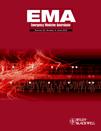
Emergency Medicine Australasia
Empowering Practitioners with Cutting-Edge KnowledgeEmergency Medicine Australasia, published by WILEY, stands as a premier journal in the field of emergency medicine, underlining its significance through its distinguished ranking as Q1 in Emergency Medicine and Q2 in Medicine (miscellaneous) as of 2023. The journal, which has been in circulation since 2004, provides a platform for high-quality research, clinical studies, and reviews that contribute to the advancements in emergency medicine practices. With a Scopus rank of 28 out of 109 in its category, it occupies a notable position within the medical community, boasting a 74th percentile ranking that reflects its impactful contributions to the field. Although it operates primarily on a subscription basis, Emergency Medicine Australasia is essential reading for researchers, practitioners, and students seeking to stay updated on the latest developments and methodologies in emergency care. This journal not only aims to disseminate critical knowledge but also fosters a collaborative environment for sharing innovations that improve patient outcomes and emergency services.
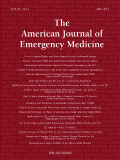
AMERICAN JOURNAL OF EMERGENCY MEDICINE
Shaping the Future of Emergency MedicineThe American Journal of Emergency Medicine, published by W B Saunders Co-Elsevier Inc, stands as a premier platform for the dissemination of high-quality research in the field of emergency medicine. With the ISSN 0735-6757 and E-ISSN 1532-8171, this esteemed journal features contributions that shape clinical practices and enhance patient care in urgent medical scenarios. Since its inception in 1983, the journal has garnered a notable Q1 ranking in Emergency Medicine and a Q2 ranking in Medicine (miscellaneous) for 2023, reflecting its significant impact in the field, as denoted by its Scopus rank of 12 out of 109, placing it in the 89th percentile. Researchers and practitioners alike benefit from the rigorous peer-review process, ensuring that only impactful studies are published, even as the journal maintains a non-open access model, allowing for selective availability of pioneering research. By fostering academic dialogue and advancing knowledge, the American Journal of Emergency Medicine plays a crucial role in addressing the dynamic challenges faced by healthcare professionals in emergency settings.
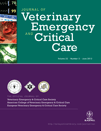
JOURNAL OF VETERINARY EMERGENCY AND CRITICAL CARE
Pioneering research for urgent animal health needs.JOURNAL OF VETERINARY EMERGENCY AND CRITICAL CARE, published by WILEY, is a leading journal in the field of veterinary science, specifically focusing on emergency medicine and critical care for animals. With an impact factor that underscores its significance in the field, this journal serves as a crucial resource for veterinary professionals, researchers, and students dedicated to advancing the care of animals in critical conditions. Since its inception in 1991, the journal has continually contributed to the knowledge base and methodological advancements in veterinary emergency practices, consistently ranking in the Q1 category for veterinary sciences, as per the latest Scopus Ranks. Located in the United Kingdom, the journal is committed to disseminating high-quality, peer-reviewed research that addresses the challenges and innovations in veterinary critical care. With its goal to enhance clinical outcomes through evidence-based practices, the JOURNAL OF VETERINARY EMERGENCY AND CRITICAL CARE remains an essential platform for scholarly communication and collaboration in veterinary medicine.

African Journal of Emergency Medicine
Elevating Standards in Emergency Medicine ResearchAfrican Journal of Emergency Medicine, published by ELSEVIER, serves as a pivotal platform for disseminating innovative research and advancements in emergency medicine and critical care nursing. Launched in 2011, this Open Access journal has quickly garnered attention for its commitment to enhancing healthcare delivery across Africa, catering to a diverse audience of researchers, practitioners, and students. With an impressive rank of #44/109 in Emergency Medicine and positioning itself in the Q2 category for Critical Care Nursing and Emergency Nursing in 2023, the journal has established itself as a significant contributor to the medical community. The journal encourages the submission of high-quality research, reviews, and case reports that can inform clinical practices and emergency protocols across the continent. Its accessibility, reflected by its open access model, ensures that vital findings are available to those who need it most, thus fostering greater collaboration and innovation in emergency healthcare. With a focus on improving patient outcomes and advancing the field, the African Journal of Emergency Medicine is an essential resource for all who are committed to emergency care and related disciplines.
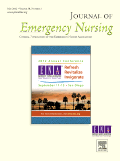
Journal of Emergency Nursing
Empowering Nurses with Evidence-Based InsightsJournal of Emergency Nursing, published by Elsevier Science Inc, serves as a premier platform for advancing the field of emergency nursing. Since its inception in 1975, this peer-reviewed journal has established itself as a vital resource for researchers, practitioners, and educators alike, with a notable impact factor and current ranking of #8 out of 32 in the Emergency Nursing category, placing it in the 76th percentile. The journal's commitment to the dissemination of high-quality evidence, innovative practices, and essential insights makes it an indispensable tool for those seeking to excel in acute care settings. Although not open access, the Journal of Emergency Nursing is dedicated to fostering knowledge and improving patient outcomes through robust research and comprehensive reviews, aligning closely with its mission to enhance emergency nursing practices and education through every issue until 2024 and beyond. For professionals and students keen on staying at the forefront of emergency care advancements, this journal provides a wealth of knowledge and resources, reflecting the critical issues and developments shaping the future of healthcare.
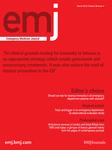
EMERGENCY MEDICINE JOURNAL
Empowering Emergency Care Through Cutting-Edge ResearchEmergency Medicine Journal, published by BMJ Publishing Group in the United Kingdom, stands as a preeminent resource within the realm of emergency and critical care medicine. ISSN 1472-0205 and E-ISSN 1472-0213 reflect its commitment to accessible research, emphasizing open access options to enhance the dissemination of vital medical insights. The journal boasts an impressive categorization, achieving a Q1 ranking in Critical Care and Intensive Care Medicine, Emergency Medicine, and miscellaneous Medicine in 2023. With a focus on high-quality peer-reviewed articles, it serves as an essential platform for sharing innovative research and evidence-based practices that enhance patient care in emergency settings. Ranking 23rd in Emergency Medicine, with a commendable 79th percentile in Scopus rankings, it underscores its position as a leading journal among peers, making it indispensable reading for researchers, professionals, and students alike who seek to stay abreast of evolving trends and practices in emergency medicine and critical care.

Journal of the American College of Emergency Physicians Open
Transforming Emergency Care with Open Access ResearchJournal of the American College of Emergency Physicians Open is a prominent Open Access journal published by WILEY that has been committed to advancing the field of emergency medicine since its inception in 2020. As a vital resource for researchers, clinicians, and students, this journal aims to disseminate innovative research findings, clinical guidelines, and educational resources that support the rapidly evolving landscape of emergency care. With a solid Q1 ranking in the emergency medicine category and positioned within the top 25 ranks of Scopus’ emergency medicine listings, the journal ensures high visibility and accessibility for critical research. As an open-access publication, it provides unrestricted access to its content, facilitating knowledge sharing and collaboration among professionals globally. The journal's significant impact on the field is reflected in its growing influence, underlining its relevance as an essential platform for advancing emergency medicine practice and research.
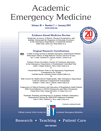
ACADEMIC EMERGENCY MEDICINE
Leading the Charge in Emergency Medicine ScholarshipACADEMIC EMERGENCY MEDICINE, published by Wiley, stands as a leading journal in the field of emergency medicine, distinguished by its impressive rankings, including Q1 categories in both Emergency Medicine and Miscellaneous Medicine. With an ISSN of 1069-6563 and an E-ISSN of 1553-2712, the journal covers a broad array of topics relevant to emergency medicine, advancing research from its inception in 1994 up to 2024. Ranked #8 out of 109 in its category, this journal sits in the 93rd percentile according to Scopus, underscoring its significance and influence within the academic community. Although it does not currently offer open access options, its rigorous peer-review process and comprehensive publication standards ensure that only the highest quality research reaches its readership. Aimed primarily at researchers, practitioners, and students in the field, ACADEMIC EMERGENCY MEDICINE serves as an essential resource for those seeking to enhance their understanding and practice of emergency care, making significant contributions to both theory and clinical applications in the field.